Read: Part 1, Part 2, Part 3, Part 4.
When I turned twenty-one in 1994, I embarked on a 500 mile solo hike on the Pacific Crest Trail across the state of Washington. The Tread of My Soul is a memoir-meets-travelogue written from the trail. Originally self published and shared with only a handful of family and friends, I recently dusted off the manuscript with the intention of sharing it with a new generation, on the 30th anniversary of its completion. Among black bears, ravens and Indian paintbrush, I grappled with the meaning of life while traversing the spine of the Cascade range with a handful of pocket edition classics in tow. Quotes from sacred texts, poets, and naturalists punctuate a coming of age tale contemplated in the wilderness.
What follows is Part 1 of the book, squared off into four long Substack posts.
For this first post, I’m also exclusively including Pacific Crest Trail Soundwalk, featuring a binaural field recording captured while hiking the first few miles on the Pacific Crest Trail up out of the Columbia Gorge in Washington. (If you haven’t already, feel free to tap that play button at the top of the post.) The 26-minute composition cycles a triad of parts inspired by the letters PCT: part one in Phrygian mode (in E), part two in the key of C, and part three with Tritone substitutions. The instrumentation is outlined with Pianet electric piano, and colored in with synthesizer and intriguing pads built with a vaguely Appalachian mood in mind. It’s on the quieter side, in terms of wildlife, but all in all, I think it compliments the reading. It concludes with a pretty frog chorus so, like the book, I’m making it unrestricted, in the hope of enticing some readers to stick with it to the end.
If you prefer, you can find The Tread of My Soul in ebook format available for free right now on Apple Books or Amazon Kindle Store (free with Kindle Unlimited, points, or $2.99). If you read it and like it, please feel free to leave a review to help others find it. Thank you.
So, without further ado, here we go:
The Tread of My Soul
Coming of Age on the Pacific Crest Trail
by Chad Crouch
ACT 1
(AT RISE we see TEACHER and STUDENTS in an art studio. It is fall term; the sun is just beginning to set when class begins. Warm light washes the profiles of eight classmates. The wood floors are splashed with technicolor constellations of paint.)
TEACHER
Hello. Welcome to class. I find role taking a tiresome practice so we'll skip over that and get to the assignment. Here I have a two-inch square of paper for you. I would like you to put your soul on it. The assignment is due in five minutes. No further explanations will be given.
STUDENT #1
(makes eye contact with a STUDENT #4, a young woman. She wears a perplexed smile on her face.)
TEACHER
Here you go.
(hands out squares of paper.)
(People begin to work. Restlessness gives way to an almost reverence, except STUDENT #5 is scribbling to no end. The Students’ awareness of others fades imperceptibly inward. Five minutes pass quickly.)
TEACHER
Teacher: Are you ready? I'm interested to see what you've come up with.
(scuffle of some stools; the sound of a classroom reclaiming itself.)
TEACHER
What have you got there?
STUDENT #1
Well, I used half of the time just thinking. I was looking at my pencil and I thought…
(taps pencil on his knee, you see it is a mechanical model)
this will never do the trick. The idea of soul seemed too intense to be grasped with only graphite. So 1 poked a pin sized hole in the paper and wrote:
(reading voice)
“Hold paper up to sun, look into hole for soul.” That's all the further I got.
TEACHER
(looking at student #2)
And you?
STUDENT #2
(smiles)
Um, I didn't know what to do so all I have is a few specks where I was tapping my pen while I was thinking. This one…
(she points to a dot)
is all, um, all fuzzy because I was ready to draw something and I hesitated so the ink just ran…
(Students nod sympathetically. Attention goes to STUDENT #3)
STUDENT #3
I couldn’t deal with just one little blank square.
(holds paper up and flaps it around, listlessly)
So I started dividing.
(steadies and turns paper to reveal a graph.)
Now, I have lots of squares in which to put my soul in. I think of a soul as being multifaceted.
TEACHER
Okay. Thank you. Next…
(looking at student #4)
STUDENT #4
(without hesitation)
I just stepped on it.
(holds paper up to reveal the tread of a shoe sole in a multicolor print.)
The tread of my soul.
• • •
The writing that follows seems to have many of the same attributes as the students' responses to the problem posed in the preceding scene. While I have a lot more paper to work with, the problem remains the same: how do I express myself? How do I express the intangible and essential part of me that people call a soul? What is it wrapped up in? What doctrines, ideologies and memories help give it a shape?
I guess I identify mostly with Student #4. Her shoe-print “Tread of My Soul” alludes to my own process: walking over 500 miles on The Pacific Crest Trail from Oregon To Canada in the Cascade Mountain Range in Washington. In trying to describe my soul I found that useful to be literal. Where my narrative dips into memoir or philosophy I tried not to hesitate or overthink things. I tried to lay it all out.
Student #1's solution was evident in my own problem solving in how I constantly had to look elsewhere; into nature, into literature, and into symbology to even begin to bring out the depth of what I was thinking and feeling. Often the words of spiritual classics and of poetry are seen through my writing as if looking through a hole. I can only claim originality in where I poke the holes.
As for Student #2, I am afraid that my own problem solving doesn't evoke enough of her charm. For as much as I wanted to be thoughtful, I wanted also to be open and unstudied, tapping my pen. What I see has emerged, however, is at times argumentative. In retrospect I see that I had no recourse, really. My thoughts on God and Jesus were molded in a throng of letters, dialogues, experiences, and personal studies prior to writing this.
Finally, in the winter of my twenty-first year, as I set down to transcribe this book, I realize how necessary it was to hike. Student #3 had the same problem. The soul is complex and cannot fit into a box. Hiking gave me a cadence to begin to answer the question what is my soul? The trail made me mindful. There was the unceasing metaphor of the journey: I could only reach my goal incrementally. This tamed my writing sometimes. It wandered sometimes and I was at ease to let it. I had more than five minutes and a scrap of paper. I had each step.
• • •
The Bridge of the Gods looks like a behemoth Erector set project over the Columbia River spanning the natural border of Washington and Oregon. My question: what sort of Gods use Erector sets? Its name derives from an event in space and time; a landslide. The regional natives likely witnessed, in the last millennium, a landslide that temporarily dammed the Columbia effectually creating a bridge—The Bridge of the Gods. I just finished reading about why geologists think landslides are frequent in the gorge. Didn't say anything about Gods. How we name things, as humankind, has something to do with space and time doesn't it? Where once we call something The Bridge of the Gods it has been contemporarily reduced to landslide. We have new Gods now, and they compel us to do the work with erector sets. Or perhaps I mistook the name: It doesn't necessarily mean Gods made it. Perhaps Gods dwell there or frequent it. Or maybe it is a passageway that goes where the Gods go. It seems to me that if the Gods wanted to migrate from, say, Mt. Rainier in Washington to Mt. Hood in Oregon, they would probably follow the Cascade Ridge down to the Bridge of the Gods and cross there.
If so, I think I should like to see one, or maybe a whole herd of them like the caribou I saw in Alaska earlier this summer, strewn across the snow field like mahogany tables. Gods, I tend to think are more likely to be seen in the high places or thereabouts, after all,
The patriarchs and prophets of the Old Testament behold the Lord face to face in the high places. For Moses it was Mount Sinai and Mount Nebo; in the New Testament it is the Mount of Olives and Golgotha. I went so far as to discover this ancient symbol of the mountain in the pyramid constructions of Egypt and Chaldea. Turning to the Aryans, I recalled those obscure legends of the Vedas in which the Soma—the 'nectar' that is in the 'seed of immortality' is said to reside in its luminous and subtle form 'within the mountain.' In India the Himalayas are the dwelling place of the Siva, of his spouse 'the Daughter of the Mountain,' and the 'Mothers' of all worlds, just as in Greece the king of the gods held court on Mt Olympus.
- Rene Daumal, Mount Analogue
These days Gods don't go around making landslides every time they want to cross a river, much less perform a Jesus walking on the water miracle. That would be far too suspicious. Gods like to conceal themselves. A popular saying is "God helps those who help themselves." I think if Moses were alive today, Jehovah would have him build a bridge rather than part the waters.
Someone said, "Miracles take a lot of hard work." This is true.
• • •
Day 1.
Bridge of the Gods.
Exhausted, I pitch my tent on the side of the trail in the hot afternoon and crawl into to take a nap to avoid the annoying bugs.
My sweat leaves a dead person stamp on the taffeta floor.
Heavy pack. A vertical climb of 3200 ft.
Twelve miles. I heaved dry tears and wanted to vomit.
Dinner and camp on a saddle.
Food hard to stomach.
View of Adams and gorge.
Perhaps I am a naive pilgrim as I cross over this bridge, embarking on what I suppose will be a forty day and night journey on the Pacific Crest Trail, with the terminus in Canada. My mother gave me a box of animal crackers before my departure so I could leave “a trail of crumbs to return by.” The familiar classic Barnum’s red, yellow and blue box dangles from a carabineer of my expedition backpack
As I cross over the bridge I feel small, the pack bearing down on my hips, legs, knees, feet. I look past my feet, beyond the steel grid decking of the bridge, at the water below. Its green surface swirls. I wonder how many gallons are framed in each metal square and how many flow by in the instant I look?
How does the sea become the king of all streams?
Because it is lower than they!
Hence it is the king of all streams.
-Lao-tzu, Tao Teh Ching
On the Bridge of the Gods I begin my quest, gazing at my feet superimposed on the Columbia’s waters flowing toward the ocean. Our paths are divergent. Why is it that the water knows without a doubt where to go; to its humble Ocean King that embraces our planet in blue? I know no such path of least resistance to and feel at one with humankind. To the contrary, when we follow our paths of least resistance—following our family trees of religion, learning cultural norms—we end up worshipping different Gods. It is much easier for an Indian to revere Brahman than it is for I. It is much easier for me to worship Christ than it is for an Indian. These paths are determined geographically and socially.
It’s not without trepidation that I begin my journey. I want to turn from society and turn to what I believe to be impartial: the sweeping landscape.
With me I bring a small collection of pocket books representing different ideas of the soul. (Dhammapada, Duino Elegies, Tao Teh Ching, Song of Myself, Walden, Mount Analogue, and the Bible.) It isn’t that I want to renounce my faith. I turn to the wilderness, to see if I can’t make sense of it all.
I hike north. This is a fitting metaphor. The sun rises in the east and arcs over the south to the west. To the north is darkness. To the north my shadow is cast. Instinctively I want to probe this.
• • •
Day 2.
Hiked fourteen miles.
Three miles on a ridge and five descending brought me to Rock Creek.
I bathed in the pool. Shelves of fern on a wet rock wall.
Swaths of sunlight penetrating the leafy canopy.
Met one person.
Read and wrote and slept on a bed of moss.
Little appetite.
Began another ascent.
Fatigued, I cried and cursed out at the forest.
I saw a black bear descending through the brush
Before reaching a dark campsite.
I am setting records of fatigue for myself. I am a novice at hiking. Here is the situation: I have 150 miles to walk. Simple arithmetic agrees that if I average 15 miles a day it will take me 10 days to get to the post office in White Pass where I have mailed myself more food. I think I am carrying a sufficient amount of food to sustain my journey, although I’m uncertain because I have never backpacked for more than three consecutive days. The greatest contingency, it seems, is my strength: can I actually walk 15 miles a day with 60 pounds on my back in the mountains? Moreover, can I continue to rise and fall as much as I have? I have climbed a vertical distance of over 6000 feet in the first two days.
I begin to quantify my movement in terms of Sears Towers. I reason that if the Sears Tower is 1000 feet, I walked the stairs of it, up and down, six times. I am developing a language of abstract symbols to articulate my pain.
I dwell on my condition. I ask myself, are these thoughts intensified by my weakness or am I feeding my weakness with my thoughts?
I begin to think about God. Many saints believed by impoverishing their physical self, often by fasting, their spiritual self would increase as a result. Will my spirit awake as my body suffers?
I feet the lactic acid burning my muscle tissue. I begin to moan aloud. I do this for some time until, like a thunderclap, I unleash voice in the forest.
I say, "I CAN'T do this,” and "I CAN do this," in turn. I curse and call out "Where are you God? I've come to find you." Then I see the futility of my words. Scanning the forest: all is lush, verdant, solemn, still. My complaint is not registered here.
And all things conspire to keep silent about us, half out of shame perhaps, half as unutterable hope.
- Rainer Maria Rilke, Duino Elegies
I unstrap my pack and collapse into heap on the trail floor, curled up. I want to be still like the forest.
The forest makes a noise: Crack, crack, crack.
I think a deer must be traversing through the brush. I turn slowly to look in the direction of the sound. It’s close. Not twenty yards off judging from the noise.
I pick myself up to view the creature, and look breathlessly. It’s just below me in the ravine. Its shadowy black body dilates subtly as it breathes. What light falls on it seems to be soaked up, like a hole cut in the forest in the shape of an animal. It turns and looks at me with glassy eyes. It claims all my senses—I see, hear, feel, smell, taste nothing else--as I focus on the bear.
And so I hold myself back to swallow the call note of my dark sobbing.
Ah, whom can we ever turn to in our need?
Not angels, not humans and already the knowing animals are aware that we are really not at home in our interpreted world.
- Rainer Maria Rilke, Duino Elegies
Remembering what I read to do when encountering a bear, I raise my arms, making myself bigger. "Hello bear," I say, "Go away!"
With the rhythm of cracking branches, it does.
• • •
Day 3.
Hiked thirteen miles.
Descended to Trout Creek, thirsty.
Met a couple en route to Lake Tahoe.
Bathed in Panther Creek.
Saw the wind brushing the lower canopy of leaves on a hillside.
A fly landed on the hairs of my forearm and I,
Complacent,
Dreamt.
I awake in an unusual bed: a stream bed. A trickle of clear water ran over stones beneath me, down my center, as if to bisect me. And yet I was not wet. What, I wonder, is the significance of this dream?
The August sun had been relentless thus far on my journey. The heat combined with the effort involved in getting from one source of water to the next makes an arrival quite thrilling. If the water is deep enough for my body, even more so:
I undress... hurry me out of sight of land, cushion me soft... rock me in billowy drowse Dash me with amorous wet...
- Walt Whitman, Song of Myself
There is something electrifying and intensely renewing about swimming naked in a cold creek pool or mountain lake.
I got up early and bathed in the pond; that was a religious exercise, and one of the best things I did. They say that characters were engraven on the bathing tub of King Tching-thang to this effect; "renew thyself completely each day; do it again and again and forever again."
- Henry David Thoreau, Walden
Is bathing, then, a spiritual exercise?
When I was baptized on June 15, 1985 in the tiled pool of our chapel in the Portland suburbs, I thought surely as I was submerged something extraordinary would happen, such as the face of Jesus would appear to me in the water. And I did do it—I opened my eyes under water— but saw only the blur of my pastor's white torso and the hanging ferns that framed the pool. I wondered: shouldn't a ceremony as significant as this feel more than just wet? I’m guessing that most children with exposure to religion often keep their eyes open for some sort of spectacular encounter with God, be it to punish or affirm them. (As a child, I remember sitting in front of the television thinking God could put a commercial on for heaven if he wanted to.)
Now, only ten years after I was baptized, I still keep my eyes open for God, though not contextually the same, not within a religion, not literally.
And when I swim in a clear creek pool, I feel communion, pure and alive. The small rounded stones are reminders of the ceaseless touch of water. Their blurry shapes embrace me in a way that the symbols and rites of the church fail to.
I hear and behold God in every object
Yet I understand God not in the least.
-Walt Whitman, Song of Myself
And unlike the doctrines and precepts of organized religion, I have never doubted my intrinsic bond to water.
And more-
For greater than all the joys
Of heaven and earth
Greater still than dominion
Over all worlds,
Is the joy of reaching the stream.
- Dhammapada, Sayings of the Buddha
• • •
Day 4.
Hiked fourteen miles. Climbed to a beautiful ridge.
Signs, yellow and black posted every 50 feet: "Experimental Forest"
Wound down to a campground where I met three people
As I stopped for lunch.
"Where does this trail go to?" he says. "Mexico," I say.
"Ha Ha," says he.
Camped at small Green Lake.
My body continues to evolve. My hair and fingernails grow and grow, and right now I've got four new teeth trying to find a seat in my mouth.
I turned twenty-one on August sixth. On August sixth, 1945 a bomb was dropped on Hiroshima. The world lost more people than it made that day. When I was born, I suspect we gained a few.
I'm an adult now, and I’m not sure where it happened or why. I wonder if someone had to stamp something somewhere because of it? A big red stamp that says "ADULT". It was a blind passage for me—just like those persons who evaporated at ground zero on August sixth, 49 years ago.
I do feel like I just evaporated into adulthood. I am aware of the traditional ceremony of turning twenty-one. Drinking. Contemporary society commemorates becoming an adult with this token privilege. Do you have any idea how fast alcohol evaporates? I am suggesting this: One’s response to this rite rarely affords any resolution or insight into growth. Our society commemorates the passage from child to adult with a fermented beverage.
I wanted to more deliberate about becoming an adult. Hence the second reason (behind a spiritual search) for this sojourn into the wilderness. I took my lead from the scriptures:
And he was in the desert forty days... He was with the wild animals and the angels attended him.
- Mark 1:13
Something about those forty days prepared Jesus for what we know of his adult life.
I also took my lead from Native Americans. Their rite of passage is called a vision quest, wherein the youth goes alone into the depth of nature for a few days to receive some sort of insight into being.
I look around me. I am alone here in the woods a few days after my birthday. Why? To discover those parts of me that want to be liberated. To draw the fragrant air into my lungs. To feel my place in nature.
…beneath each footfall with resolution.
I want to own every atom of myself in the present and be able to say:
Look I am living. On what? Neither
Childhood nor future grows any smaller....
Superabundant being wells up in my heart.
- Rainer Maria Rilke, Duino Elegies
• • •
Day 5.
Hiked to Bear Lake and swam.
Saw over a dozen people. Eighteen miles.
Watched raven fly from tree and listened.
Found frogs as little as my thumbnail.
Left Indian Heaven.
Surprise. My body is becoming acclimated to long distance hiking. I know because when I rest it is a luxury rather than a necessity.
The light is warmer and comes through the forest canopy at an acute angle from the west, illuminating the trunks of this relatively sparse old growth stand. I am laying on my back watching a raven at his common perch aloft in a dead Douglas fir.
It leaps into its court and flap its wings slowly, effortlessly navigating through the old wood pillars. The most spectacular sense of this, however, is the sound: a loud, slow, hollow thrum: Whoosh whoosh, whoosh.... It’s as if the interstices between each pulse are too long, too vacant to keep the creature airborne. Unlike its kind, this raven does not speak: there are no loud guttural croaks to be heard.
Northwest coastal tribes such as the Kwakiutl thought the croaks of a raven were prophetic and whoever could interpret them was a seer. Indeed, the mythic perception of ravens to be invested with knowledge and power is somewhat universal.
My raven is silent. And this is apt, for I tend to think the most authentic prophecies are silent, or near to it.
Great sound is silent.
- Lao Tzu, Tao Teh Ching
The contour of that sound and silence leaves a sublime impression on me.
• • •
Day 6.
Hiked twelve miles.
Many uphill, but not most.
Met several people.
One group looked like they were enjoying themselves—two families.
I spent the afternoon reading my natural history book on a bridge.
Voles (forest mice) relentlessly made efforts to infiltrate my food bag during the night.
I am reading about how to call a tree a “Pacific Silver Fir” or an “Engelmann Spruce” or “Western Larch” and so on. If something arouses my curiosity on my walk, I look in my natural history book to see if it has anything to say.
Jung said, "Sometimes a tree can teach you more than a book can."
Siddhartha Gautama, the Buddha was enlightened beneath a fig tree.
I read that a 316-year-old Ponderosa Pine east of Mt. Jefferson bears scars from 18 forest fires. Surely that tree taught us one thing a book couldn't. All things are clues. Everything is part of a complex tapestry of causality.
The grand design behind these mountains has something to do with plate tectonics. Beneath me the oceanic plate is diving beneath the continental at twenty to sixty degrees putting it well under the coastline to where it partially melts and forms magma. This has been happening for millions of years. Every once and a while this magma channels its way up to the surface, cools and turns into igneous rock. Again and again, this happens. Again and again, and yet again until a mountain is made; a stratovolcano.
Meanwhile, on top, water, glaciers, wind, and sun are trying to carry the mountains away grain by grain. Geologic time is as incomprehensible as it would be to imagine someone's life by looking at his or her gravestone. These mountains are gravestones.
Plants fight to keep the hillsides together. Plants and trees do. But every summer some of those trees, somewhere, are going to burn. Nature will not tolerate too much fuel. New trees will grow to replace those lost. Again and again. Eighteen times over and there we find our tree, a scarred Ponderosa Pine in the tapestry.
And every summer the flowers will bloom. The bees will come to pollinate them and cross-pollinate them: next year a new color will emerge.
And every summer the mammals named homo-sapiens-sapiens will come to the mountains to cut down trees, hike trails, and to put up yellow and black signs that read Boundary Experimental Forest U.S.F.S. placed evenly 100 yards apart so hikers are kept excessively informed about boundaries.
Here I am in the midst of this slow-motion interplay of nature. I walk by thousands of trees daily. Sometimes I see just one, sometimes the blur of thousands. It is not so much that a tree teaches me more than a book; rather it conjures up in me the copious leagues of books unwritten. And, I know somewhere inside that I participate. What more hope could a tree offer? What more hope could you find in a gravestone?
• • •
Day 7.
Hiked twenty miles in Alpine country near Mt Adams.
More flowers—fields of them. Saw owl. Saw elk.
Wrote near cascading creek.
Enjoyed walking. Appetite is robust.
Camped at Lave Spring.
Saw six to ten folks.
Didn't talk too much.
Before I was baptized, during the announcements, there was a tremendous screech culminating in a loud cumbf! This is a sound which can be translated here as metal and glass crumpling and shattering in an instant to absorb the forces of automobiles colliding.
In the subsequent prayer, the pastor made mention of the crash, which happened on the very same corner of the chapel, and prayed to God that He might spare those people of injury.
As it turns the peculiarly memorable sound was that of our family automobile folding into itself, and it was either through prayer or her seat belt that no harm came to my sister who was driving it.
Poor thing. She just was going to get some donuts. Do you know why? Because I missed my appointment with baptism. There is time in most church services when people go to the front to (1.) confess their sin, (2.) confess their faith in Christ as their only personal savior, and (3.) to receive Him. This is what is known as the “Altar Call”. To the embarrassment of my parents (for I recall the plan was for one of them to escort me to the front) the Alter Call cue—a specific prayer and hymn—was missed and I sat expectant till the service end. The solution was to attend the subsequent service and try harder.
I don't recall my entire understanding of God and Jesus then, at age eleven, but I do remember arriving at a version of Pascal’s reductive decision tree that there are four possibilities regarding my death and salvation:
1. Jesus is truly the savior of mankind and I claim him and I go to heaven, or
2. Jesus is truly the savior of mankind and I don’t claim him and I end up in hell, or
3. Jesus isn't the savior of mankind and I die having lived a somewhat virtuous life in trying to model myself after him, or
4. Jesus isn't the savior of mankind and I didn't believe it anyhow.
My sister, fresh with an Oregon drivers license, thought one dose of church was enough for her and, being hungry, went out for donuts and failed to yield.
Cumbf!
Someone came into the chapel to inform us. We all went out to the accident. The cars were smashed and askew, and my sister was a bawling, rocking little lump on the side of the street. We attended to her, calmed her, and realized there was yet time for me to get baptized. We went into the church and waited patiently for the hymn we had mentally earmarked and then I was baptized.
I look back on the calamities of that day affectionately.
Prize calamities as your own body.
- Lao Tzu, Tao Teh Ching
Those events that surrounded the ritual decry a ceremony so commonplace one often misses the extraordinariness of it; of humanity; the embarrassment of my parents; the frustration and impetuous flight of my sister; and the sympathy and furrowed brow of our pastor. These events unwind in my head like a black and white silent film of Keystone Cops with a church organ revival hymn for the soundtrack. There was something almost slapstick about how that morning unfolded, and once the dust had settled and the family was relating the story to my grandmother later that day, we began to find the humor in it.
Hitting things and missing things and this is sacred. All of it.
Because our body is the very source of our calamities,
If we have no body, what calamities can we have?
- Lao Tzu, Tao Teh Ching
Most religions see the body as temporal and the soul as eternal. Hence, 13th century monks cloistered themselves up denying their bodies space and interaction that their souls might be enhanced.
I see it this way: No one denies their bodily existence, do they? Look, your own hand holds this book. Why do you exist? You exist right now, inherently, to hold a book, and to feel the manifold sensations of the moment.
If this isn't enough of a reason, adjust.
I've heard it said, "Stop living in the way of the world, live in the way of God."
My reply: "Before I was baptized, I heard a cumbf, and it was in the world and I couldn’t ignore it. I’m not convinced we would have a world if we weren't supposed to live in the way of it."
Read: Part 1, Part 2, Part 3, Part 4. Or find the eBook at Apple Books or Amazon Kindle Store.

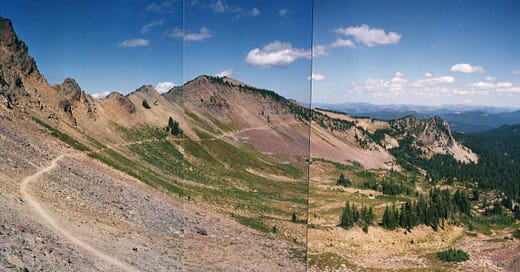
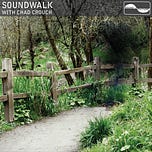

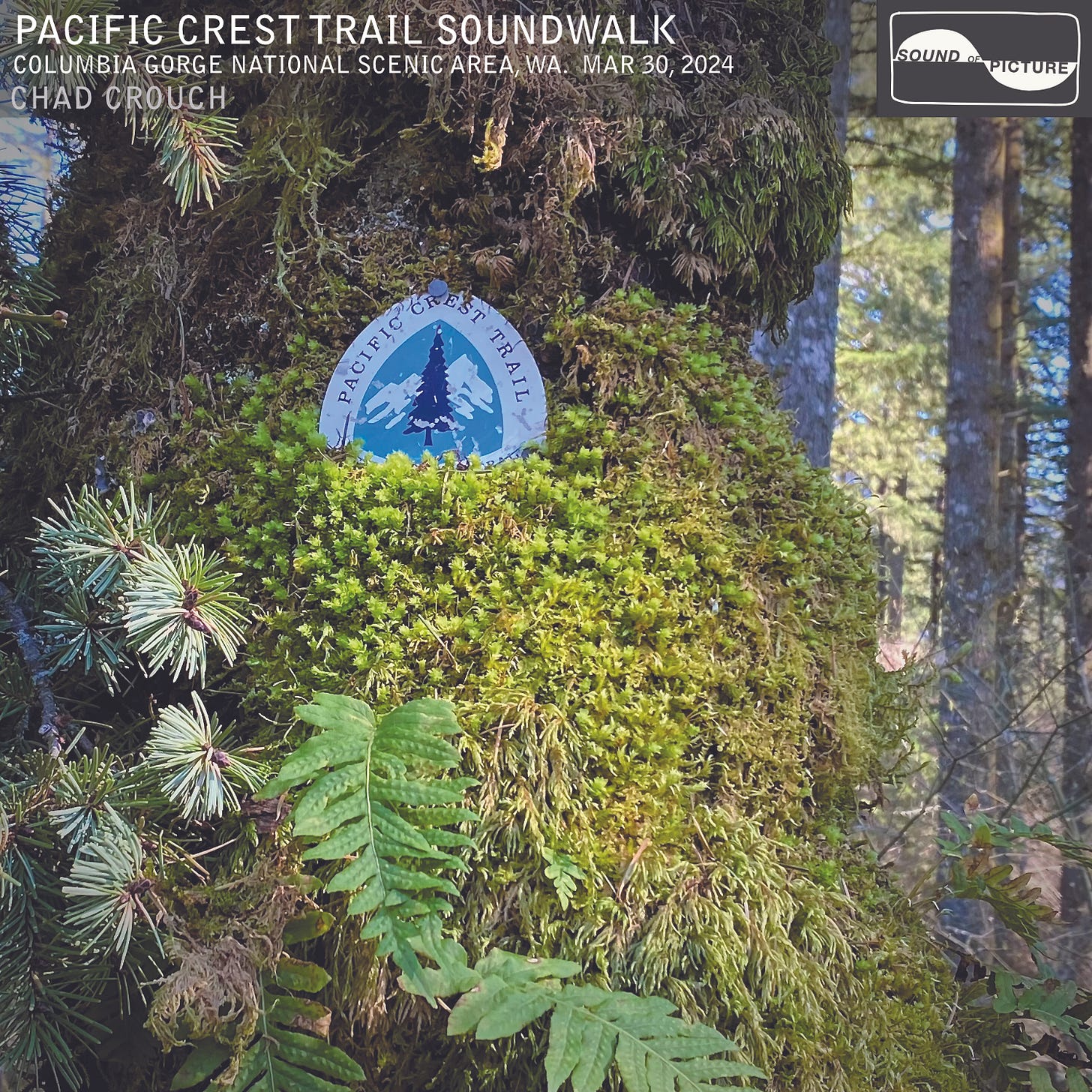

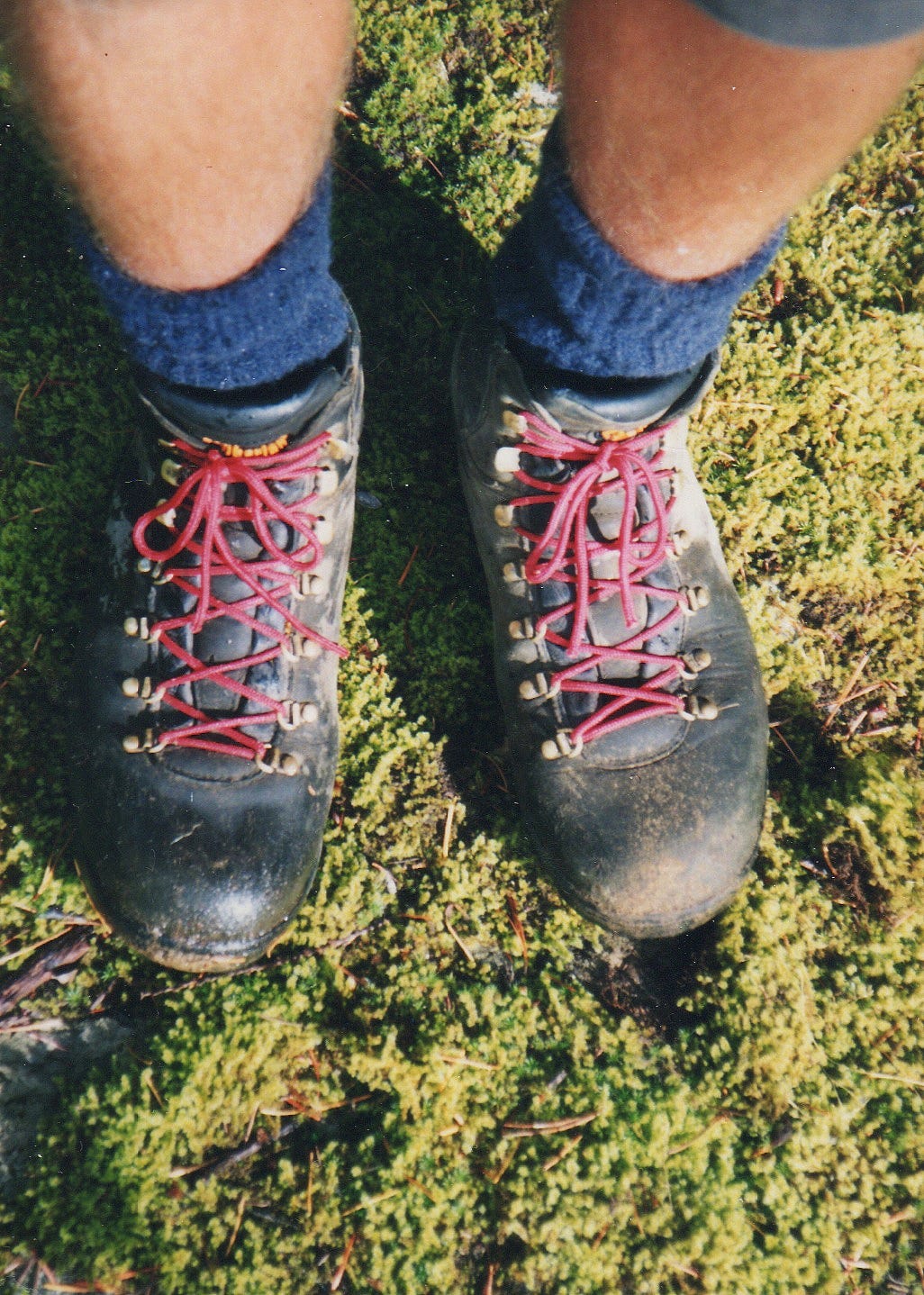
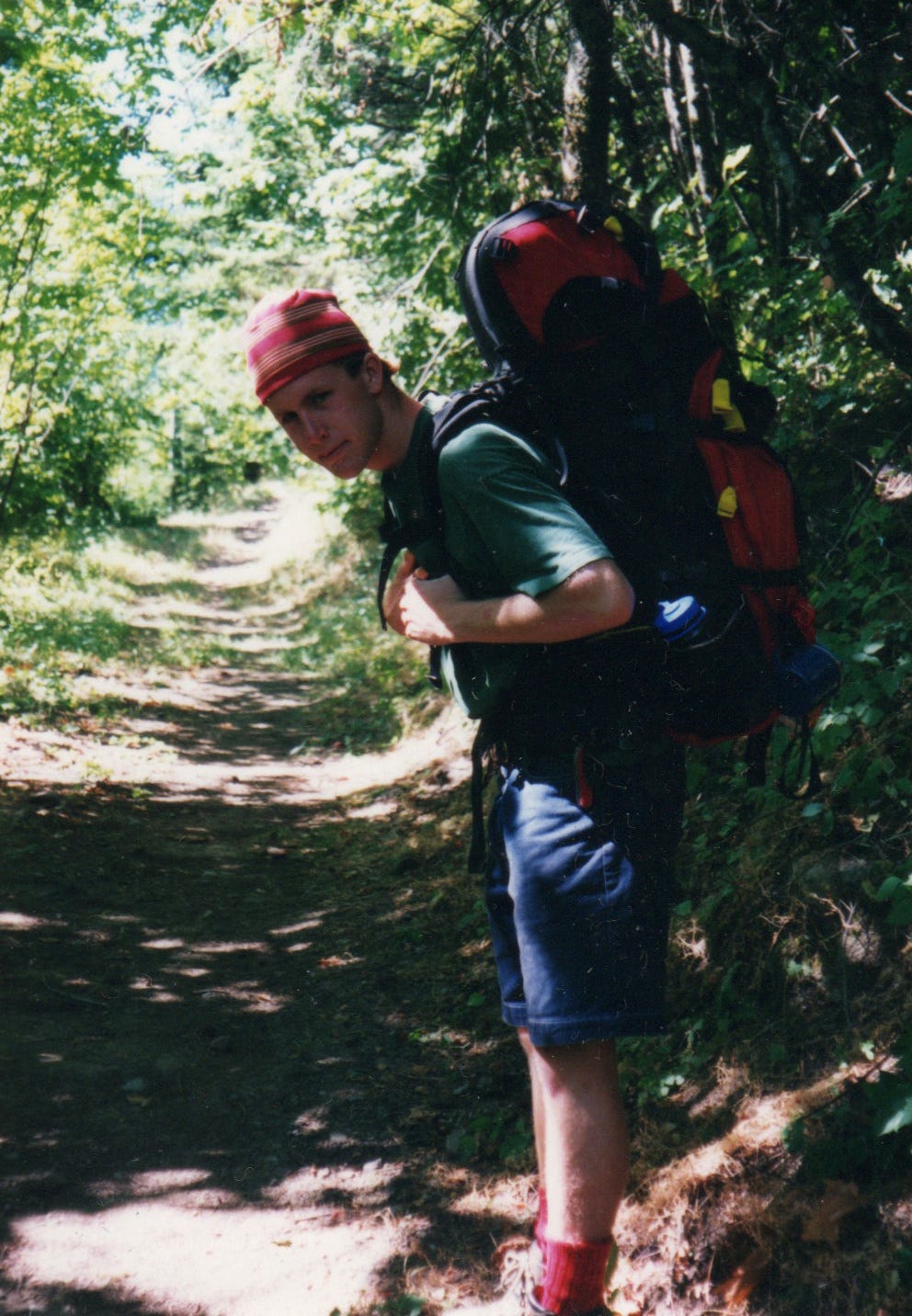
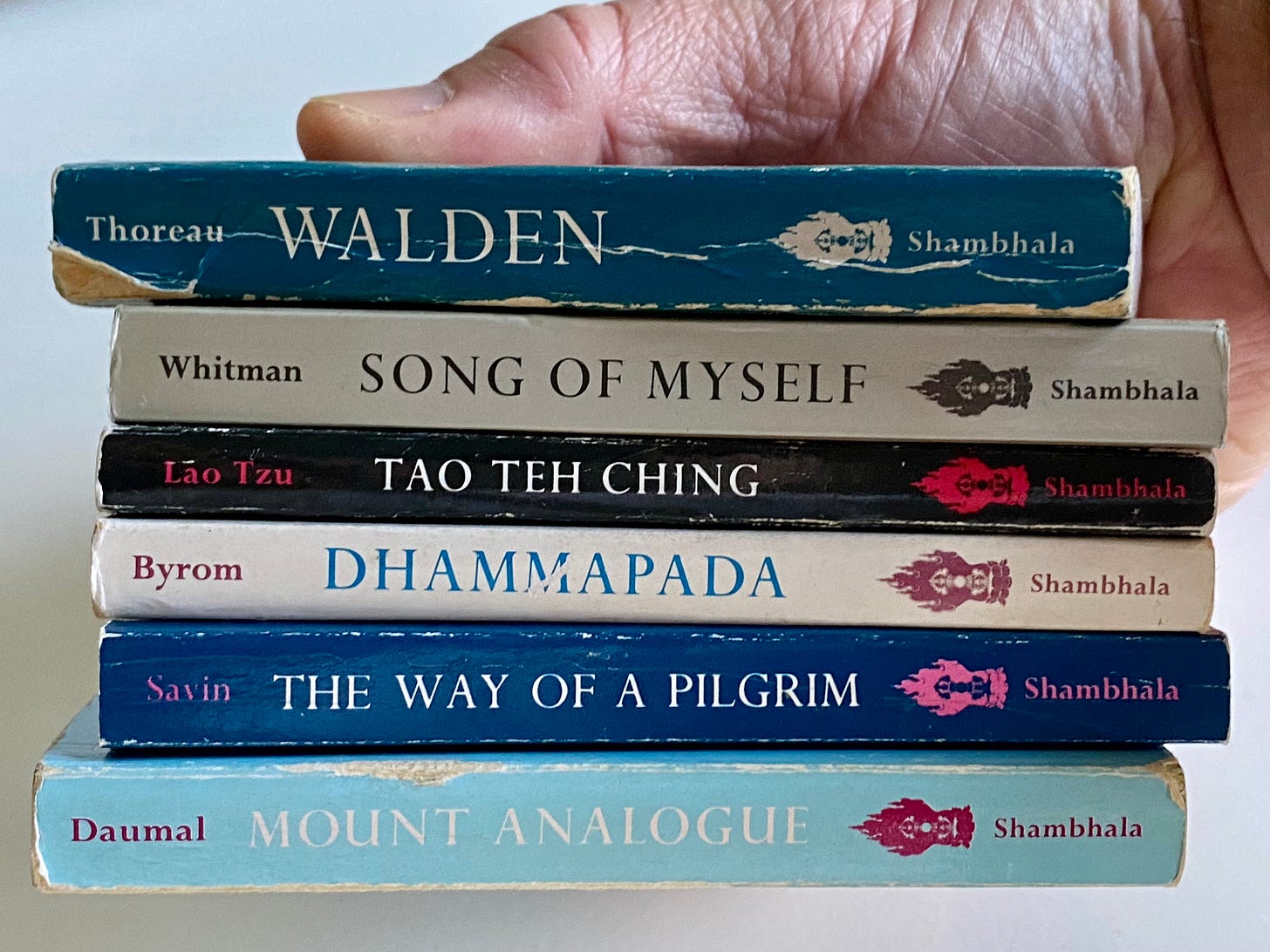
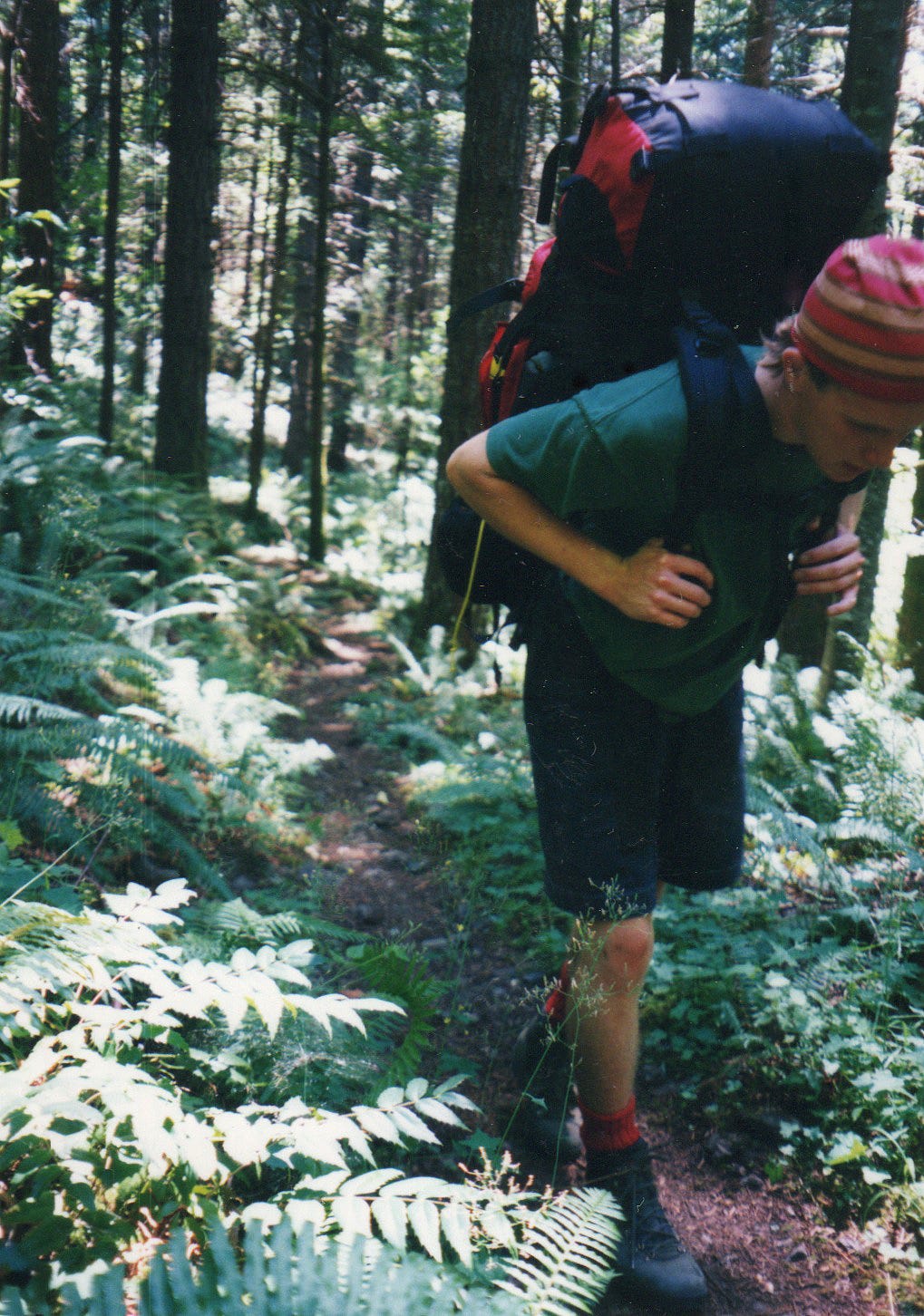
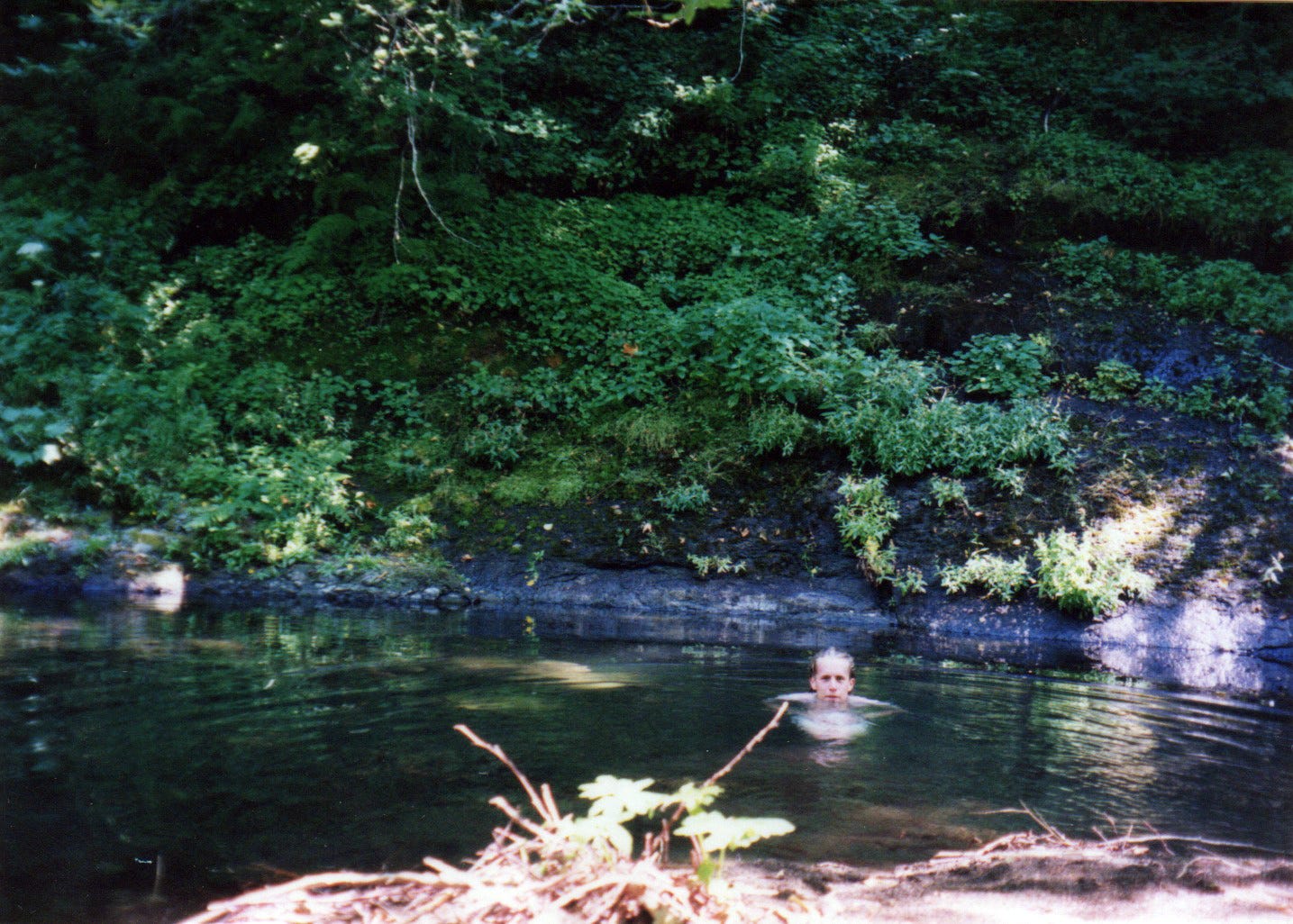
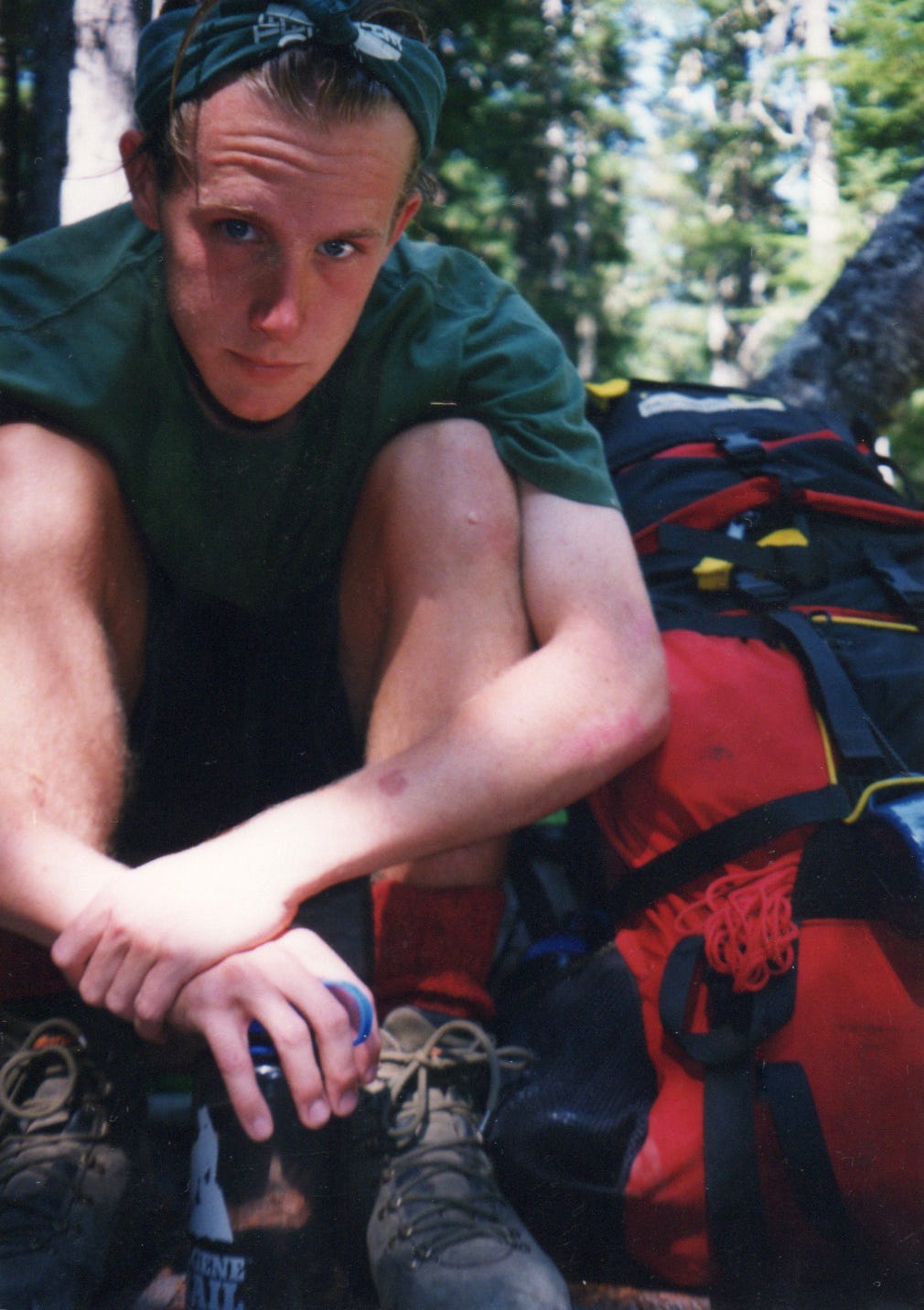

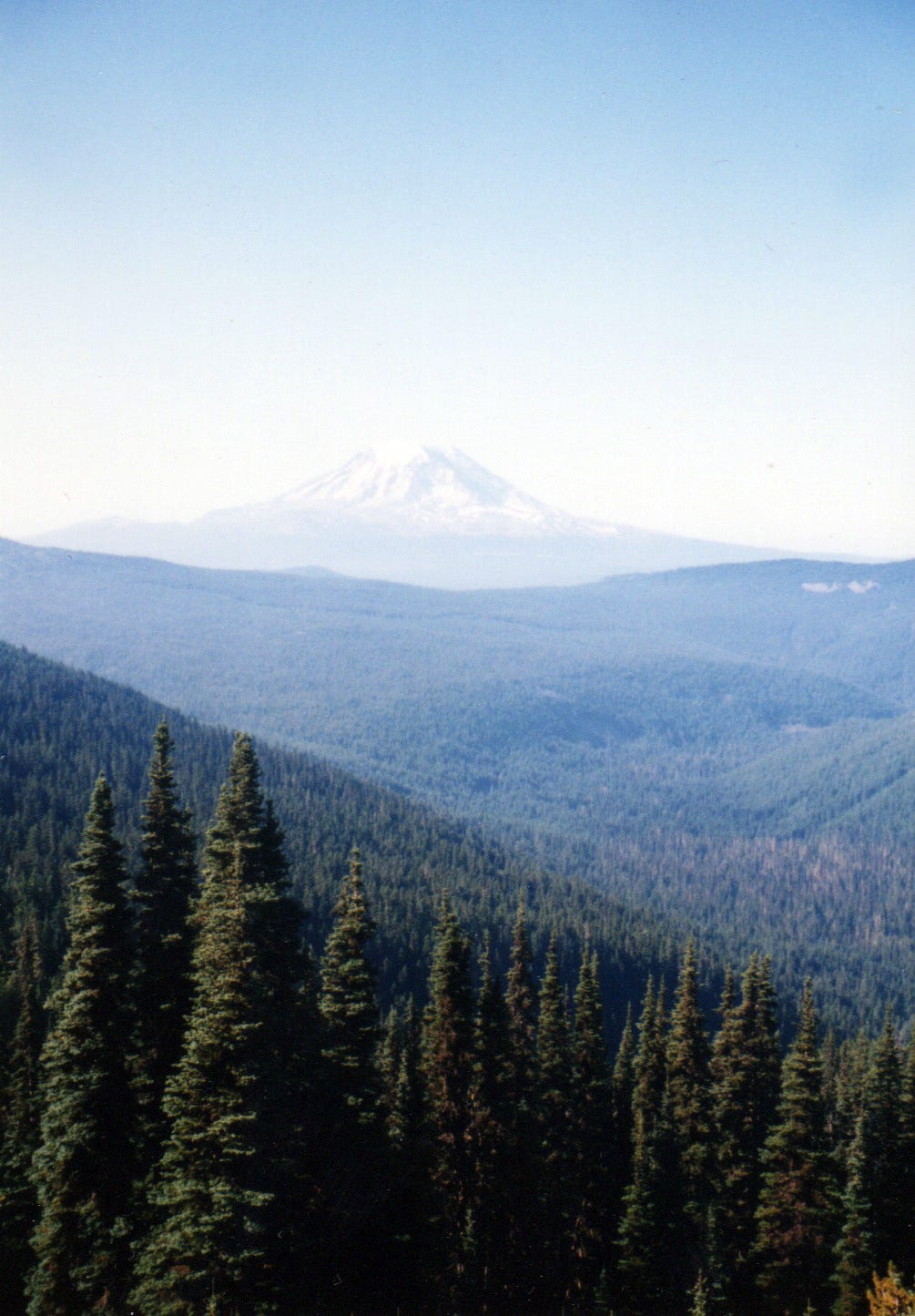










Share this post